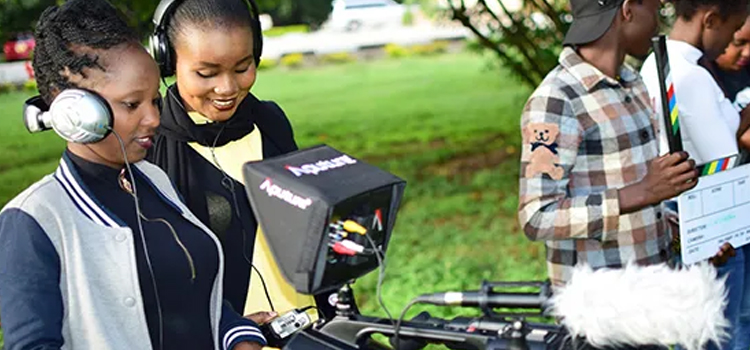Programme offered in this department are National Diploma and Higher National Diploma. This programme can be studied on an open distance and flexible study option which can be studied via our Learning Management System on The Polytechnic Ibadan ODFeL portal. This programme is ideal for everyone including those in employment or with other commitments, providing flexible study options that fit around work or family constraints.
National Diploma
Goals:
The National Diploma (ND) in Mass Communication is meant to give the students technical education and professional skills necessary for employment and job creation in the various areas of Mass Communication industry such as Newspapers, Magazines, Radio, Television, Film/Video, News media, Public Relations, Advertising, News Agency, Government and Corporate Information Service.
Objectives:
On completion of this course, the diplomats will be able to carry out the following functions:
Gather, investigate and report news for the print, broadcast and online media.
Elect, edit and prepare for publications, news items, features, photographic graphics and multimedia materials and result of investigation for prints.
Produce, present and direct programmes for the electronic media.
Plan, prepare and produce materials for public relations and advertising purposes.
Know various outlets/contacts for commercial utilization of feature and magazine articles.
Identify outlets for publishing of features and magazine articles.
Know how to negotiate terms for publishing articles.
Understand rights of the article author.
Higher National Diploma
Goals:
The Higher National Diploma (HND) in Mass Communication programme is intended to produce effective and efficient technologist with adequate practical and professional skills necessary for employment and job creation in the various areas of Mass Communication industry such as Newspapers, Magazines, Radio, Television, Film and Video, News media, Public Relations, Advertising, News Agency, Government and Corporate Information Service.
Objectives:
On completion of this programme, the diplomats should be able to carry out/perform all the listed functions specified under the objectives of the National Diploma programme at a higher level and with little or no supervision at all:
Gather, investigate and report news for the print, broadcast and online media.
Elect, edit and prepare for publications, news items, features, photographic graphics and multimedia materials and result of investigation for prints.
Produce, present and direct programmes for the electronic media.
Produce, present and direct programmes.
Plan, prepare and produce materials for public relations and advertising purposes.
Source various outlets/contacts for commercial utilization of feature and magazine articles.
Publish features and magazine articles.
Negotiate terms for publishing articles and rights of the article author.
The general entry requirements for the ND & HND progoramme are:
Admission into National Diploma (ND) programmes:
1) Candidates must have at least four credits in the WASC, GCE ‘O’ Level or the Senior Secondary Certificate (SSC) in no more than two sitting.
Compulsorily each candidate must have credits in English Language and Mathematics (Literature in English and Oral English are not acceptable in place of English Language) AND two other subjects from Economics, Business Methods, Principles of Accounts, Literature in English, Commerce, History, Statistics, Geography, Government, Agricultural Science/Biology.
2) Applications are also invited from suitably qualified candidates who have four O’ Level credits pass in relevant subjects but did not sit for UTME. They are however required to register on the JAMB platform and continue with their application. All applications and submissions should be made on or before the closing date.
Please note that all Higher National Diploma (HND) applicants must possess all the listed O' Level requirements under ND, alongside SIWES Completion Letter and National Diploma Result from recognized accredited Polytechnic.
The programme will be for 4 Semesters that will be done within 2 years (minimum) & maximum of 4 years . Institutions will award the Diploma certificates to candidates who successfully completed the programme after passing prescribed coursework, examination, projects and the supervised industrial work experience. Such candidates should have completed between 80 - 96 semester credit units as prescribed in the programme.
Diplomas shall be classified as follows:
- Distinction – GPA of 3.50 and above
- Upper Credit – GPA of 3.00 – 3.49
- Lower Credit – GPA of 2.50 – 2.99
- Pass – GPA of 2.00 – 2.49
- Fail – GPA of below 2.00
It should be emphasized that the National Diploma (ND) programme is terminal and candidates graduating from the programme should be able to perform at that level. Each Diploma programme is expected to run for 4 semesters of 17 weeks each. For the first two years, a candidate must take at least six courses per semester (Minimum of 18 credit units while the maximum varies between 24 and 26). While for the remaining two years candidates can take minimum 0 credit unit and maximum of 12 credit units per semester.
The Higher National Diploma (HND) programme is expected to run for 4 semesters of 17 weeks each, For the first two years, a candidate must take at least six courses per semester (Minimum of 18 credit units while the maximum varies between 23 and 26). While for the remaining two years candidates can take minimum 0 credit unit and maximum of 12 credit units per semester.


The curriculum of the diploma programme consists of four main components viz:
A. The General Education component includes courses in Social Sciences Studies/Mathematics/ English Language /Communication, Citizenship. Entrepreneurship. The General Education courses shall account for not more than 15% of the total contact hours for the programme.
B. Foundation Courses include Economics, Quantitative Techniques, Statistics, and Law etc. The number of hours for the foundation courses shall be between 10 – 15% of the total contact hours for the programmes.
C. Professional Courses are specialized core courses which give the student the theory and practical skills he needs to practice in his field of specialization at the technician/technological level.
D. Final year (ND & HND) students in this programme are expected to carry out individual project work (not term paper). This should be produced and bounded by the student. Projects supervisors will be assigned to each students.